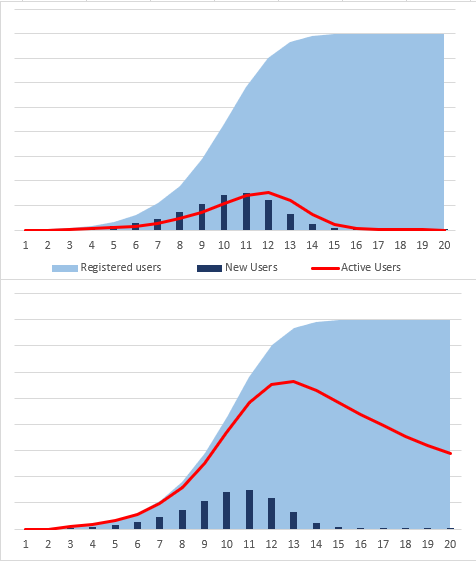- ARPDAUPosted 13 years ago
- What’s an impressive conversion rate? And other stats updatesPosted 13 years ago
- Your quick guide to metricsPosted 13 years ago
Are consumers falling out of love with Facebook games? Engagement with Facebook Games Has fallen 25% since December 2010
I’ve been doing some analysis of Facebook games over the past year. In particular, I’ve been looking at the engagement rate (DAU/MAU) for Facebook games.
Between December 2010 and September 2011, engagement has fallen by around 25% for some of the most popular games on Facebook.
Across the board, engagements have fallen (with the exception of Mafia Wars). Intrigued by this, I looked at the engagement rates of a handful of new games. These new titles have lower engagement rates than most of these other titles had in December 2010.
Even the Sims Social, one of EA’s successes, has lower engagement rate than many games back in December.
Why are Facebook engagement rates in decline?
I haven’t done an exhaustive analysis, so it’s hard to be sure of underlying trends. It’s possible that my small sample size of games means that engagement rates are rising, just not for the games that I’ve picked. If we assume, for a moment, that there is downwards pressure on engagement, what are the possible reasons?
- Increased choice: there are a lot of games on Facebook now. Not to mention all of those on iOS and Android which are keeping people away from their browsers. Could it just be that no game can keep the same level of engagement as in Facebook’s heyday as a gaming platform in 2009?
- Summer: When I was an equity analyst covering the Internet sector, people asked me why Internet penetration and the number of innovative startups was much higher in Scandinavia, then northern Europe, then southern Europe. “Better weather, longer summers” was my stock answer. It’s glib, but at least partially true. You should expect traffic to fall during the summer for most games businesses (the southern hemisphere isn’t significant enough in traffic terms to offset the US and Western European holiday season). So these falls might be temporary, driven by nothing more than lots of Facebook gamers taking a two week summer holiday in the sun.
- Virality shutdown: Trip Hawkins has put together a great post on the decline in Facebook’s virality. Put simply, as Facebook has worked to shut down virality (read: unwanted game spam), it has put a heavy dent in DAU/MAU ratios. Back in 2009, these could be as high as 40%. Now, as the charts show, achieving 20% is a great result. Trip’s view is that the declining virality – and hence increasing customer acquisition cost – is starting to make smartphone platforms look more exciting than Facebook.
Is the Facebook gaming era over?
In my experience, forecasters, analysts and companies always underestimate seasonal factors in their calculations. Their forecasts run following a straight line, with no real awareness of how the time of year affects their business. (Ask a retailer if this is realistic…)
I am hopeful that we will see some recovery in engagement rates in the final quarter of this year. However, across the board, I am reducing the engagement rates that I recommend my clients use for their forecasts and benchmarking.
The summer may end, but there is a lot more choice out there than there was. Maybe customers are becoming more discerning, and the opportunity for one-size-fits-all games is coming to an end.
That would lead to more choice for gamers, and more developers having to make money by satisfying – to the full – a smaller niche of gamers than before.














